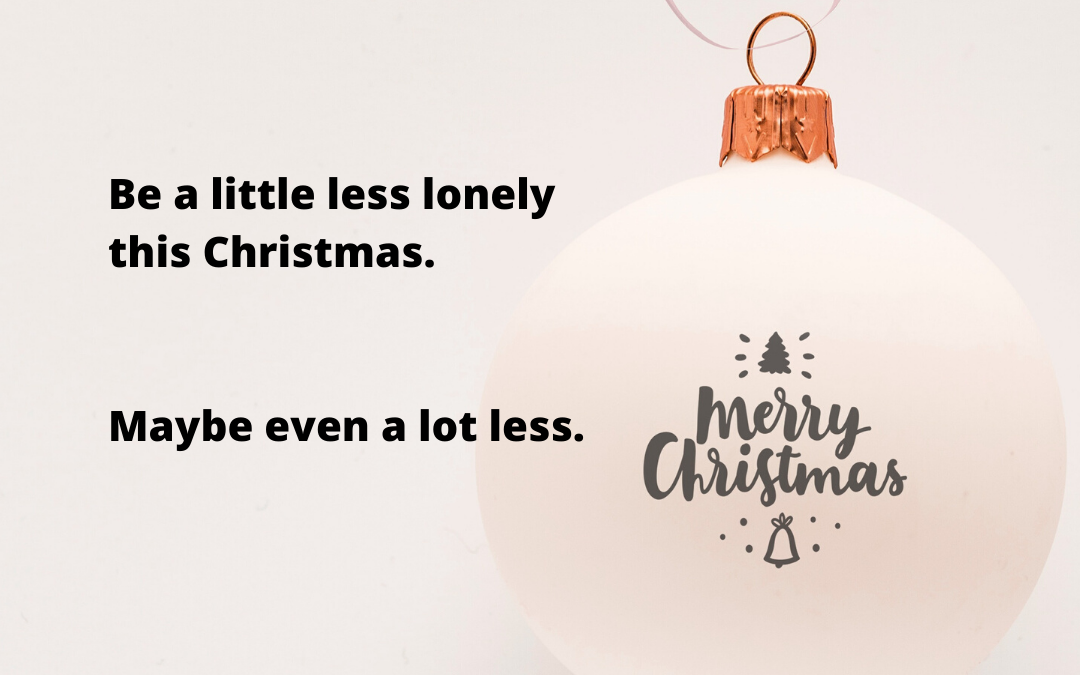
by Lucy | Dec 18, 2019 | biblical counseling, emotions
When Christmas cheer brings on isolating loneliness, how can your survive, even thrive?
This short article shows that you really can find God in your loneliness at Christmas! And it’s NOT another tiresome to-do list!
Loneliness at Christmas, or any time of the year, unsettles us. It’s uncomfortable and unwanted. It may drive us to seek false comforts: TV, Facebook, sleep, food, booze, sex. It often turns us inward, compounding the lonely ache in our hearts.
Consider Lydia Brownback’s description of loneliness at Christmas.
“Looks like winter is here!” Brownback called to the mom next door as she and her neighbors cleared their cars and walkways.
“Indeed it is!” the neighbor responded. “And the timing of all this snow is perfect. After supper we’re going to make hot chocolate and decorate the Christmas tree. The kids are really excited.” Picturing her neighbor spending quality time with family sparked a deep sense of loneliness in Brownback. She had no one to share the festivities with, and it hurt, she shared in her book, Finding God in My Loneliness.[1]
The good news is that when we seek God as our true treasure, we find what we’ve been looking for all along: Him.
What Is Loneliness?
Loneliness is “an emotionally painful sense of not being connected to others. The lonely person may feel unwanted, isolated, and left out.”[2] It is a pain of disconnect. It is not social isolation, per se.
There are many people who love their alone time and do not feel lonely. Rather, it is the distress of what one has and what one wants, played out in the arena of social relationships. David Powlison pinpointed this disconnect: “Fear and desire are two sides of the same coin. A sinful fear is a craving for something not to happen… If I long to be loved, I’m terrified of rejection. If I fear pain or hardship, I crave comfort and pleasure.”[3]
Loneliness Is Common
Married or single, young or old, male or female, counselor or counselee–we all have suffered this empty feeling of disconnectedness at some point. For some of us, it’s chronic and unrelenting. Loneliness may affect three out of four Americans, a 2018 survey reveals. And it’s bad for our health, social scientists claim.
Connecting through social media doesn’t help. In fact, it may worsen it. It appears that many people are substituting online connections for in-person connections.
What Does Loneliness Reveal?
The reason we feel lonely is God created us for community with Him and others. He fills the lonely ache in our heart.
Loneliness began in the Garden long ago when the first couple rebelled against God and looked for fulfillment apart from Him. Their sinful declaration of independence separated them from God and one another. It brought Adam and Eve fear, shame, guilt, and loneliness.
The good news is that God had a plan from the beginning to restore man to a personal relationship with Him. Indeed, God made us with the capacity for loneliness to point us to Him, and we find what our hearts desire only in Him.
“And in Him you have been made complete, and He is the head over all rule and authority” (Col. 2:10).
Man’s False Solutions
The earthly solutions for loneliness fail to bring real and lasting change. Among them are:
- baking another batch of holiday cookies
- jamming the calendar with activities
- scrolling Facebook and Instagram
- binging on Hallmark Christmas movies
When we choose our own solutions over God’s, our loneliness deepens. In contrast, God’s solutions for loneliness draw us to Him and others.
God’s True Solution
We were created for a deep, personal relationship with God that cannot be satisfied through work, hobbies, marriage, or anything else. Keeping our eyes focused on Jesus and serving others solves our loneliness problem. We must resist focusing inward when we feel disconnected.
To get to the root, the lonely person might seek the answers to these two questions:
- Who am I focusing on?
- What am I living for?
There are two choices: God or self. Matthew 10:39 clarifies our need for God’s remedy. It reads, “Whoever finds his life will lose it, and whoever loses his life for my sake will find it.”
With this in mind, we find God in our loneliness. We can admit that when we turn to our own solutions for loneliness, we are looking to self for completion. In addition, we can choose to seek to treasure Him above all.
Keep Doing These 4 Things
1. Spend time in the Word daily helps us know Him.
2. Prayer.
3. Attend a Bible-believing church allows us to hear the gospel preached and to know and serve other believers.
4. Intentionally serve others in our families and neighborhoods through volunteering. And volunteering need not be formal; simply listening deeply is a gift.
Most of all, we recognize that our loneliness is pointing us to God. So, during the holidays, when loneliness may become particularly painful, resist turning inward. Rather, let this unwanted feeling help you realize something’s missing. That something is found in Jesus alone.
Those who belong to Jesus are never truly alone. He has the remedy for loneliness at Christmas and all year long.
[1] Lydia Brownback, Finding God in My Loneliness, (Wheaton, IL: Crossway, 2017), 13.
[2] Mary Somerville, “Coping with Loneliness,” National Association of Nouthetic Counselors, Annual Conference, 2005, mp3.
[3] David Powlison, “Dynamics of Biblical Change,” class notes, Christian Education and Educational Foundation (CCEF), 2002. Quoted in Lydia Brownback, Finding God in My Loneliness, (Wheaton, IL: Crossway, 2017), 25.
This article appeared first here at The Biblical Counseling Coalition. Minor edits for space.
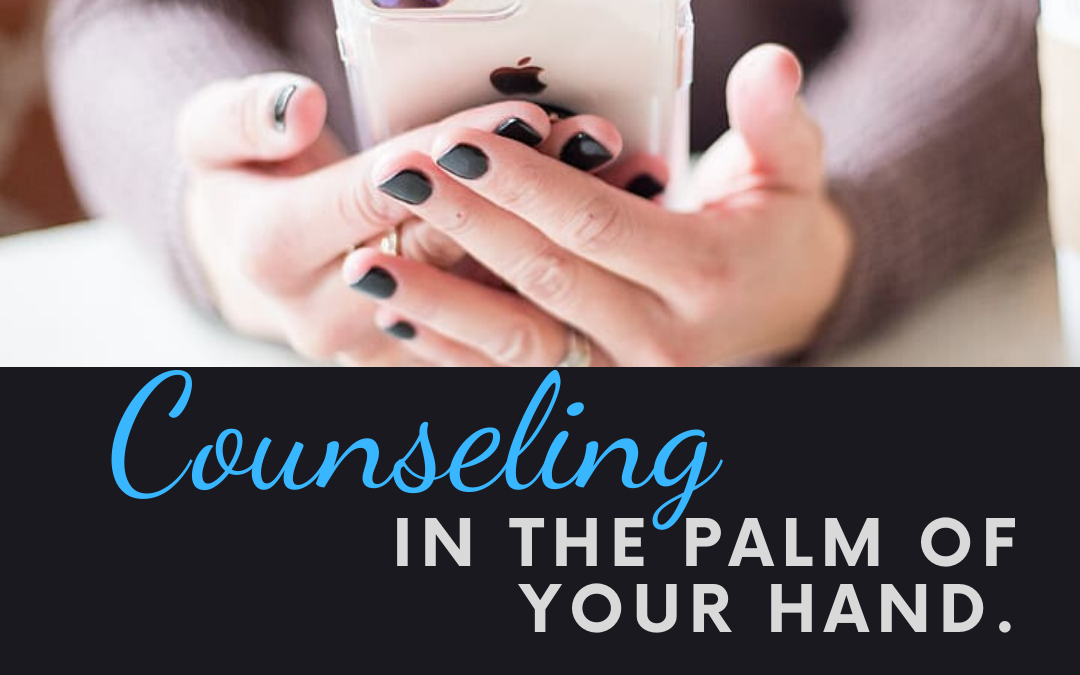
by Lucy | Nov 18, 2019 | biblical counseling
What if you could meet with a biblical counselor when and where you choose? Online biblical counseling via video and real-time chat puts counseling in the palm of your hand, literally.
It has three huge advantages as well. As a counselor who’s provided online biblical counseling since 2008, I’d love for you to know more about it. Perhaps it’s the right choice for you or someone you care about.
Equally awesome: It’s affordable.
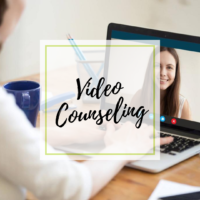
When a hurting person meets with a biblical counselor via video, the world opens.
Counselees living in Topeka or Timbuktu, and every place in between, can receive the benefits of counseling by the Word and in the power of the Spirit, wherever they are. In fact, all that’s needed to “deliver” biblical counseling is the internet. And some 4.5 billion have internet access worldwide.
If you’ve used Facetime or video conferencing, you’ll understand the concept of video counseling. It’s talking with someone through a device while also seeing them. Today’s technology makes this possible and even commonplace.
Advantage #1: Easy access
Meeting by video allows easy access to biblical counseling. Counselees need only a smartphone, tablet, or a computer and the internet. Most counselees use the Internet at their home for counseling; some drive to a nearby McDonalds or Starbucks (which typically offer free Internet) and have their counseling appointment in the privacy of their car.
Due to easy access, I’ve had the privilege to meet with counselees in my town and across the globe since 2008 when I began this type of counseling.
Here are a handful of the women I’ve counseled via video:
- Kari*, a pastor’s wife and mom on the East Coast.
- Jackie, a retiree in the UK.
- Anna, a working, married mom of two children in Germany.
- Susie, a stay-at-home mom of two preschoolers near Los Angeles.
- Beth, a single, soon-to-be missionary in NYC.
- Liz, an unmarried career woman in Australia.
They each desired biblical counseling to look at the heart’s primary question: Whom will you trust? God or self? And their goal was the same; that is, lasting change.
Advantage #2: Convenience
When I mentioned that I’ve counseled folks who lived in my town near my office, perhaps you wondered why. There are at least four reasons, and all revolve around convenience.
- Horrible weather. (Think snow and sleet.)
- Infants and preschoolers at home.
- Car trouble.
- Disability, physical and/or emotional (such as severe fear of leaving home).
But the fifth type of convenience is equally important: meeting with a biblical counselor when the nearest one is a great distance away.
Kari, a pastor’s wife, desired biblical counseling for a life-dominating sin. (She too is ACBC-certified like me and the counselors at Biblical Counseling Center.) However, she’d have to travel to another state to get it. Plus, after working all day, she wanted to go home and hug her young daughter and husband, and then have her counseling appointment.
Advantage #3: Biblical counseling anywhere!
Biblical counseling connects people to the gospel and to the wisdom of the Word, and it provides compassion and effective care as well as practical solutions to life’s struggles. With video counseling, it may be as close as your pocket, literally.
Using video on your phone or other device means you can receive counseling wherever you are. Many apps help make this possible; a few are Skype, Zoom, Facetime, WhatsApp, and FreeConferenceCall. Biblical Counseling Center’s counselors are now using SimplePractice, an app that lets you meet with your biblical counselor in a private virtual room. To begin the appointment, you simply click a link at your appointment time.
A couple of years ago, a teacher at an English-speaking school in Tunisia sought me for counseling for her anxiety. She liked talking with someone back home. We had a crystal-clear connection almost always. She said that if she hadn’t found a biblical counselor like me who offered counseling via video, she’d have missed out. Biblical counseling helped her intentionally and consistently apply God’s Word to her struggle and overcome it. She praised God for this new way of connecting.
Downside: But what if a call drops?
Truth be told, a downside of counseling via video is the occasional dropped call. For this possibility, my counselees and I have a plan in place, including who calls whom. And almost always we’re picking up where we left off within a minute or two.
For all the advantages of video counseling, including easy access and convenience, I am anticipating an expansion of it. In fact, I still have one continent left to deliver biblical counseling: Antarctica! If you know someone in need of counseling near the South Pole, send me a text.
*Identifying information has been altered for this article.
This article appeared first here at BiblicalCounselingCenter.org and has been edited slightly.
Faithfully yours,
Lucy
by Lucy | Feb 13, 2018 | biblical counseling, relationships
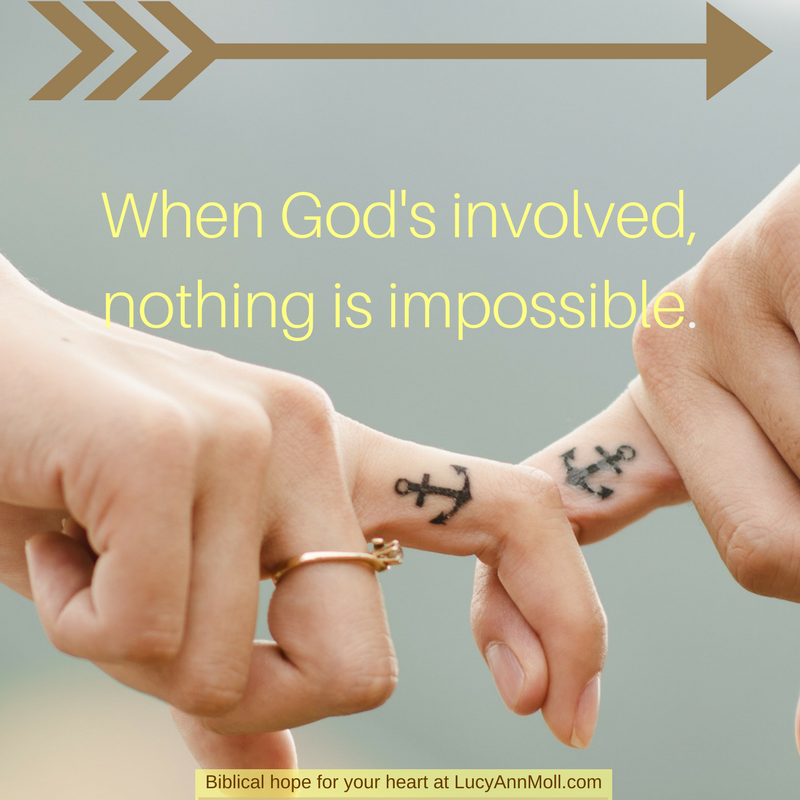 Marriage: Is it too late for mine? In this frank article, Julie Ganschow says when God’s involved, nothing is impossible. . even when husbands move on or wives check out. Julie is listed here on our Heart2Heart Counseling Directory. Her article appeared first here and is reprinted with permision.
Marriage: Is it too late for mine? In this frank article, Julie Ganschow says when God’s involved, nothing is impossible. . even when husbands move on or wives check out. Julie is listed here on our Heart2Heart Counseling Directory. Her article appeared first here and is reprinted with permision.

“Is it too late to save my marriage?”
I have been asked this question over and over in the counseling office. And I hesitate to say that “too late” applies to a marriage that involves a Christian, and especially two Christians. I also hesitate because that implies that God is not able to change them.
When God is involved, nothing is impossible!
There’s Hope. . .Always
When troubles persist even in a “Christian” marriage, damage continues to mount and love grows cold. The actions of love cease to exist as withholding of affection, attention, and serving each other become commonplace. Bitterness and resentment often grow between the couple. And distance becomes preferable.
This is where things usually are by the time the couple comes for biblical counseling.
I want to encourage you by reminding you nothing is impossible when God is involved. This is true even if your husband has left you, moved out, or moved on. When people are willing to do what God asks of them in spite of how they feel great things happen!
Maybe You’ve Checked Out
That being said, some women reach that certain point emotionally where they just give up and refuse to believe anything will ever change. I call it “rounding the corner.” When this happens it is very rare for her to return to the marriage. Her heart hardens. She refuses to cooperate anymore in counseling, or to give her husband another opportunity to change and get it right.
Sometimes it is because he has promised for months or years to change and nothing lasting has happened. Sometimes she finds someone else. And other times she is just without hope anymore.
All of these are sad, and even sinful responses a person can have to someone else’s sin. That may sound harsh to you, but I speak from the perspective that God is able to do more than we ask or imagine according to His will.
Click & Tweet!
It is not God’s will that two people who make a covenant before Him to be husband and wife . . .decide they don’t want to be married anymore.
Change Begins in the Heart
Christian woman, if you want to save your marriage, begin by becoming husband-oriented.
Click & Tweet!
Eph. 5:22-24 gives us some instructions about our role in the marriage with respect to submission.
Wives, submit yourselves to your own husbands as you do to the Lord. For the husband is the head of the wife as Christ is the head of the church, his body, of which he is the Savior. Now as the church submits to Christ, so also wives should submit to their husbands in everything.
But how many women have ceased complaining and arguing but are unsubmissive in their hearts? Many I fear!
Women who are not husband-oriented are as much a problem as husbands who are not wife-oriented! Many women have become so supremely selfish! In counseling I hear about “my career”, “my private time”, “my time for the spa” (or shopping or fill in the blank). With this attitude, soon the couple leads separate lives.
Make a New Commitment
If this describes you totally or even remotely, then it is time to make a new commitment to become a “new person.” Yes. . .1 + 1 = 1
If you have lived for years or even months independently as a couple, it is going to take some work from both of you to change this. You will need to commit to change, change of the heart. But there is hope.
Sharing Hope with Your Heart,

by Lucy | Aug 22, 2017 | biblical counseling, book reviews, emotions, relationships |
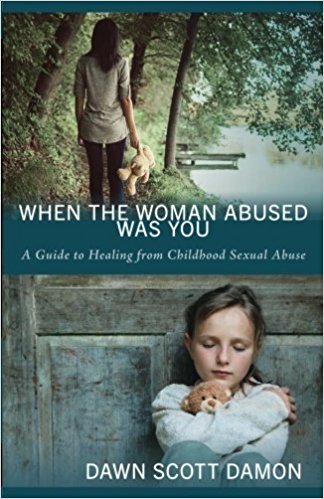 You have a choice to heal, even when you’ve faced childhood sex abuse, among the most awful experiences a woman can have. In this article by acclaimed author Dawn Scott Damon, you’ll discover potholes on the road to recovery.
You have a choice to heal, even when you’ve faced childhood sex abuse, among the most awful experiences a woman can have. In this article by acclaimed author Dawn Scott Damon, you’ll discover potholes on the road to recovery.
BONUS: BOOK GIVEAWAY! If you’d like to enter the giveaway for Dawn’s latest book, When the Woman Abused Was You, leave a comment at this blog post or contact me. Use the words, “I want Dawn’s book!” I’ll contact the winner through email by Friday. Thanks! –Lucy

Some women live for decades unaware of their abusive past. Others who were abused as children live in the shadows of shame, afraid to confront the monsters of the past. Still other women let their abuse define them.
But there is another choice: the choice to heal.
Click & Tweet!
The choice to heal can be difficult, yet it is the only choice that brings healing and new life.
So what things hold us back from making the choice to heal?
Potholes on the Road to Recovery
FEAR: We are afraid we will slip into an emotional “hole” and never get out again. Or we’re
afraid to give up our old coping mechanisms or to be seen as “weak.” Or we may fear going
crazy, losing a relationship, or facing the truth or allowing ourselves to feel. No matter the
fear, denial is destructive. Ignoring a wound only brings festering. Commit to honestly looking at your past and grieving your losses.
PRIDE: We’re unwilling to admit we have a problem. We’re not one of “them.” We don’t want to be identified as weak or a sexual abuse survivor. Everyone else has a problem. We default to
control and manipulation, and we are afraid to trust people.
NEGATIVE ATTITUDE: We develop a victim mindset. We stake a claim for what we believe we deserve and build a case for ourselves. But our attitude is our choice and the basis of self-control. We can refuse to think like a victim
by refuting “thought saboteurs.”
THOUGHT SABOTEURS:
anger, apathy, blame, criticism,
depression, dishonesty, fear, guardedness, hatred, indifference, intolerance, irresponsibility, jealousy, mistrust, pessimism, pride, resentment, revenge, sadness, self-pity, shame, skepticism, suspicion, and a victim mentality.
Self Evaluation
Are you struggling with pain from your past? With
childhood abuse? Is it time to take steps toward
healing? Pray through the areas above and ask God to help you
face your fears and recognize pride,
negative attitudes, and thought saboteurs. You’ve taken your first steps toward healing, and your life
will never be the same
You’ve carried scars long enough. It’s time to shed the layers of pain that hold you captive and find freedom and healing.
In When the Woman Abused Was You, author, pastor, and survivor Dawn Scott Damon openly shares from her own abuse experience and serves as a guide to help you make your way through the arduous healing journey. With raw and honest transparency, Dawn helps you take the necessary steps that will lead you to your own powerful breakthrough and personal healing encounter.
Experience new freedom you never thought possible. The journey may be difficult—even exhausting—but you’ll find reward and fulfillment as you transform into a confident, fulfilled, and overcoming woman.
“You’ve carried scars long enough. Its time to shed the layers of pain that hold you captive and find freedom and healing.” ~ Dawn Scott Damon
About Dawn
 Dawn Scott Damon is a pastor, speaker, and author whose most recent book, When the Woman Abused Was You, released in 2017 and is the second book in a series. Dawn’s first book in this series, When A Woman You Love Was Abused has touched thousands of lives – both men and women.
Dawn Scott Damon is a pastor, speaker, and author whose most recent book, When the Woman Abused Was You, released in 2017 and is the second book in a series. Dawn’s first book in this series, When A Woman You Love Was Abused has touched thousands of lives – both men and women.
Dawn worked closely with New York Times bestselling author Cecil Murphey (90 Minutes in Heaven, When A Man You Love Was Abused) and together they presented a conference, When Someone You Love Was Abused, Help for Those Suffering from Childhood Traumas, in Michigan and Georgia..
Dawn also writes a blog for women who have experienced trauma. It is named Freedom Girl Sisterhood at freedomgirlsisterhood.com.
Sharing Hope with Your Heart,

by Lucy | May 9, 2017 | biblical counseling, biblical counseling, relationships
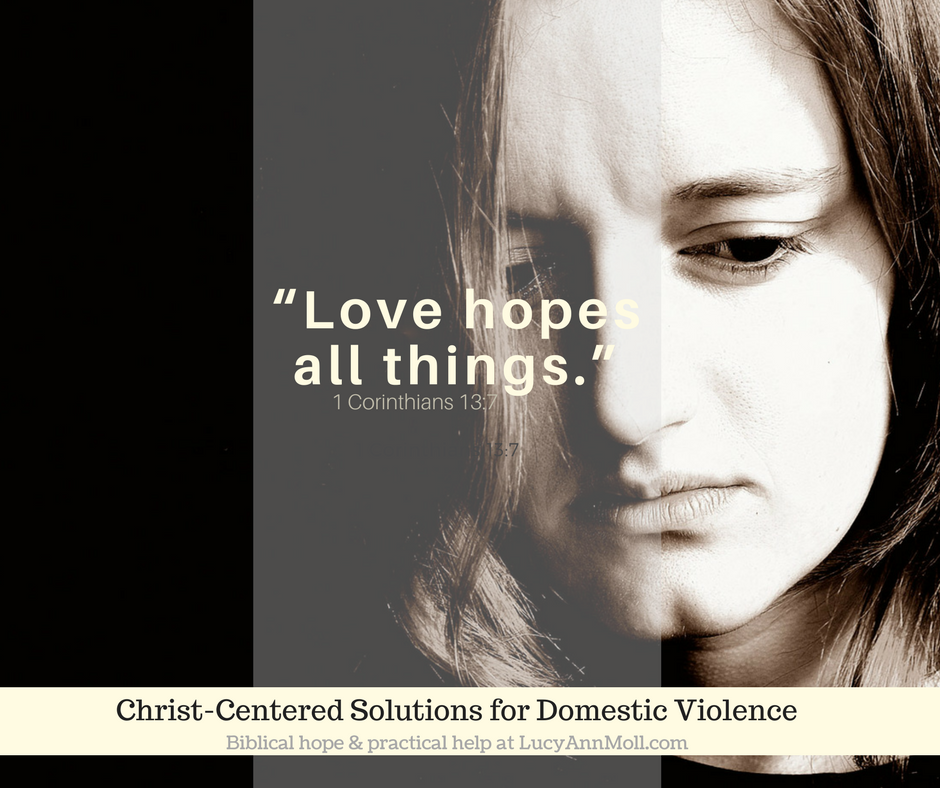 Abused? Were you abused, phyically or sexually, in your marriage? In part 2 of this multi-part series on domestic violence, guest writer Jim Newheiser carefully looks at common assertions and takes a balanced view. This post appeared first here at the Biblical Counseling Coalition website and is reprinted with permission.
Abused? Were you abused, phyically or sexually, in your marriage? In part 2 of this multi-part series on domestic violence, guest writer Jim Newheiser carefully looks at common assertions and takes a balanced view. This post appeared first here at the Biblical Counseling Coalition website and is reprinted with permission.
Read Part 1 here: When to believe the victim, when to believe the abuser

I am thankful to God that many necessary and important books and articles are being written to increase awareness of physical and sexual abuse. Abuse affect both the society at large and the Christian community in particular. Spiritual leaders have been rightly admonished for their failure to protect at-risk women and children.
Battered wives have been wrongly told that if they were just more loving and submissive, their husbands would change and the abuse would stop. They are then wrongly sent back to take further verbal and physical beatings. Many church leaders need to repent of their failure to “rescue the weak and needy; [and] deliver them out of the hand of the wicked” (Psalm 82:4 ).
).
While I affirm the importance of understanding the dark nature of abuse and protecting the victims of abuse, I am concerned that some, in their zeal to correct the failure of the past, have swung too far the other way. This can lead to false accusations and unnecessary family breakups.
I would like to give a few examples of what I believe to be common overstatements, and for each one, I will describe the good intention behind the statements, the harm which can be caused because of imbalanced thinking, and a more balanced way of expressing the same concerns.
If You Feel Abused, Then You Were Abused?
ASSERTION: If you feel abused, then you were abused.
- The valid concern: This statement is often made to express the reality that abuse may have taken place even if the abuser does not recognize or acknowledge his behavior (yelling, pushing, bullying, coercion, threats, and intimidation) as wrong.
- The harm that can be caused: On the other hand, the Bible teaches that it is possible to wrongly interpret the words, actions, and motives of others (1 Corinthians 2:11).
For who knows a person’s thoughts except their own spirit within them? In the same way no one knows the thoughts of God except the Spirit of God. 1 Corinthians 2:11
For example, Eli falsely accused Hannah of drunkenness because her lips were moving as she prayed (1 Samuel 2:12ff). We cannot judge one person merely by the subjective feelings of another. For example, a man may be in a rush and accidentally bump into his wife (with whom he had had a recent conflict) as he turns a corner. She may accuse him of doing it deliberately to harm her when that was never his motive.
Words also can be misunderstood. What is taken by one person as angry and abusive might have never been intended as such. Nor might it have been interpreted this way by an objective third party.
Scripture reminds us: “Love hopes all things” (1 Cor. 13:7); in other words, love seeks to assume the best.
3. It would be better to say: A person who feels abused should be helped to objectively evaluate what has happened and to get assistance if genuine abuse has taken place. Part of this objective evaluation involves considering the ongoing pattern and cumulative effect of the accused person’s behavior, as well as the immediate accusation at hand. Proper evaluation over time keeps us from wrongly escalating the consequences for one individual incident while also not dismissing the whole situation because one incident wasn’t deemed as abusive.
Sometimes a Victim Has a Sin Issue Too
ASSERTION: It is never the victim’s fault.
- The valid concern: Many abusers claim that their victims are to blame because the victim provoked him or failed to be as good a wife or child as they should be. Many victims suffer from false guilt. There is no valid excuse for physical or sexual abuse.
If it is possible, as far as it depends on you, live at peace with everyone. Romans 12:18
2. The harm that can be caused: Some victims have sin issues which also need to be addressed. I counseled in a case in which a wife would berate and insult her husband, saying “Come on Jesus man, hit me!” She admitted that she felt that she had won the argument when he finally struck her. Again, I emphasize there was no excuse for him hitting her. But she also needed to address her personal sinfulness.
There have been cases of sexual assault in which the woman got herself into an extremely compromising and dangerous situation (i.e., drunk, alone, and making out with a man with whom she is not married). Again, the man should have stopped when she said, “no”
Click & Tweet!
(also see Habakkuk 2:15). If he assaults her, he is guilty of a crime and should be punished. But she also needs to acknowledge before God her personal sin in the situation. Deuteronomy 22:23-24 addresses situations like this.
3. It would be better to say: Abuse is never justified, but victims may need to examine themselves to see if they have any sin for which they also need to seek God’s forgiveness.
(Friend, if someone has abused you, please seek help from a caring pastor, a spiritually wise woman at your church, or from a biblical counselor, who counsels the compassionate, effective Word to your hurting heart. Learn more about biblical counseling by Skype.–LAM)
Sharing Hope with Your Heart,





 Marriage: Is it too late for mine?
Marriage: Is it too late for mine?
 You have a choice to heal, even when you’ve faced childhood sex abuse,
You have a choice to heal, even when you’ve faced childhood sex abuse,
 Dawn Scott Damon is a pastor, speaker, and author whose most recent book, When the Woman Abused Was You, released in 2017 and is the second book in a series. Dawn’s first book in this series, When A Woman You Love Was Abused has touched thousands of lives – both men and women.
Dawn Scott Damon is a pastor, speaker, and author whose most recent book, When the Woman Abused Was You, released in 2017 and is the second book in a series. Dawn’s first book in this series, When A Woman You Love Was Abused has touched thousands of lives – both men and women.



